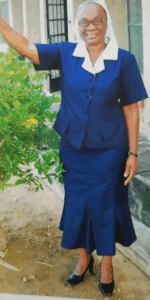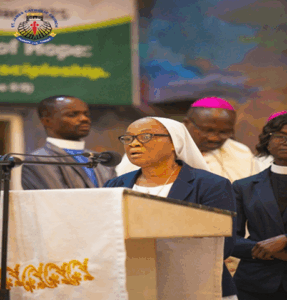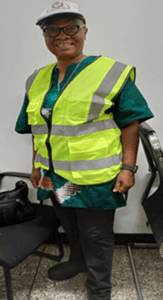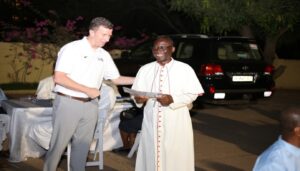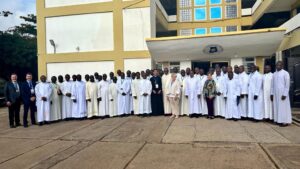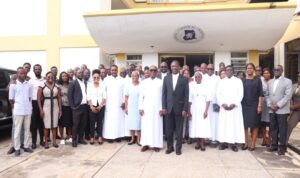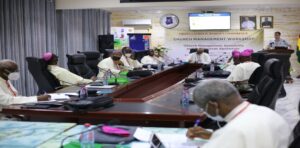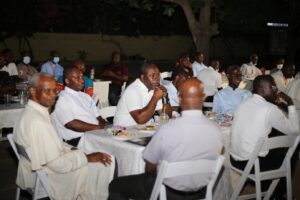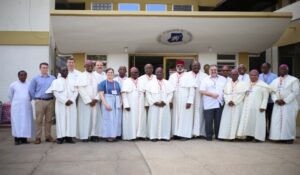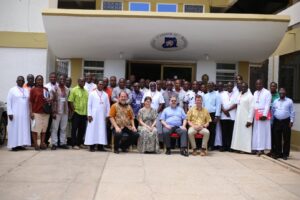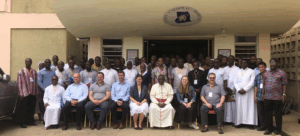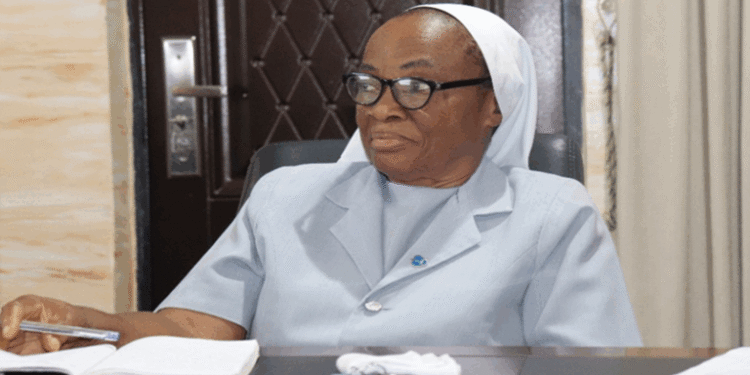Sr. Elizabeth Odinakachi Mgbaramuko’s Six Years Service at the National Catholic Secretariat (NCS), Accra
I started work at the NCS on Monday, 1st July, 2019, as Communications and Programmes Officer, Department of Social Communications (DEPSOCOM), with special duties to the office of the then Secretary General of the GCBC, Very Rev. Fr. Lazarus Anondee. In that capacity, I assisted the office in handling correspondence, writing reports and served as Recording Secretary to the NCS Senior Leadership Team (SLT) and Senior Management Team (SMT) Meetings. I also served as Recording Secretary to the Diocesan Finance Committee.
Administrators’ Meeting that held annually at the NCS. I served as Recording Secretary to some NCS Ad hoc committees, especially the joint Planning Committee of the Symposium of Episcopal Conferences of Africa and Madagascar (SECAM) and the NCS, for the GCBC’s hosting of the 19th SECAM Plenary Assembly, which was held at GIMPA, Accra, in July 2022. I also took part at some levels of planning and execution of some of the statutory and non-statutory programmes of the GCBC, as well as in the internal programmes of the NCS.
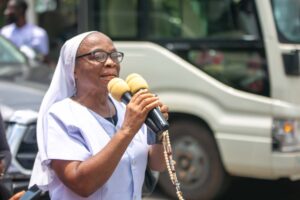
Exclusive Interviews
Apart from carrying out my assigned duties, I took delight in engaging some of the GCBC personalities in exclusive interviews, on some topical issues of the day or their attainment of significant landmarks in their life and ministry. Prominent among these exclusive conversations was the one I had with the then-President of the GCBC, the Most Rev. Philip Naameh, on the Golden Jubilee of SECAM, held at Kampala, Uganda, from September 20th-29th July 2019, especially on the “Kampala Document” which was a fallout from the jubilee; and the one with the Most Rev. Charles Gabriel Palmer- Buckle, then Vice President of the GCBC, on the reality of the COVID-19 pandemic, and some others. It was one area of proficiency in my writing vocation that was employed judiciously in the present apostolate. All my exclusive conversations with the personalities and issues involved were published in “The Catholic Standard” Newspaper and on social media. The first three years of my life and apostolate at the NCS were very vibrant. Life and health seemed to have shone forth from me, as I glowed in the apostolate.
COVID-19 Pandemic
However, within the same period, the COVID-19 pandemic, which lasted from 2019 to 2020/2021, proved a very challenging and devastating period for everyone. At the high point of carrying out our responsibilities, some of us were said to have tested positive for the vicious virus, but thanks be to God, we all survived it.
During the period, the GCBC called out to individuals, Parishes, Dioceses, societies in the Church and institutions to send donations (materials or financial or both) to the NCS to enable the Conference to reach out to the victims in affected areas, especially to the Health Centres in the interior villages. The GCBC also made a cash donation to the Government in the fight against the COVID-19 pandemic.
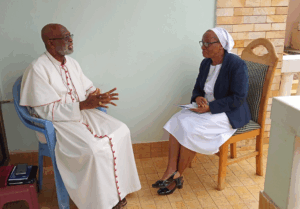
The DEPSOCOM and the Secretary General’s office took up the responsibility of receiving the donations on behalf of the GCBC, and I participated in covering and reporting on the various Dioceses and groups that came with their donations. The NCS also collaborated with the Government in organising a vaccination exercise for the Bishops, which we reported and was published in “The Catholic Standard” and other print and electronic media, and that served as an encouragement to the people, and they made themselves available for the vaccination exercise.
Episcopal Phase of Synod on Synodality
During the Episcopal phase of the Synod on Synodality, held at the Eusbett Conference Centre, Sunyani, 7th-10th June 2022, I played the active role of sharing and reporting to the larger group, on behalf of the Women Religious; on the need for the Church, especially her Priests to calm down on excessive clericalism and work more in collaboration with other pastoral agents.
Including the Women Religious. I was also interviewed by the Obuasi Diocesan DEPSOCOM Director, Mr. Charles Owusu Antwi, who came up with a powerful video production on the auspicious event.
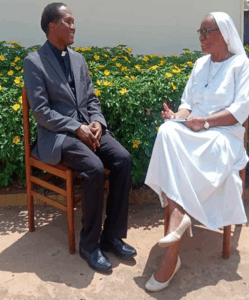
Before I knew it, the first term of three years was over, and the contract was renewed in June 2022, for a second term of another three years.
Akosombo Dam Spillage – During the Akosombo Dam spillage in September 2023, which led to widespread flooding and displacement of many communities along the Volta River in the Volta Region, places like Mepe, Battor, and
Sogakope: A similar appeal was made by the GCBC, which also received positive responses, and what was received was equally distributed and reported.
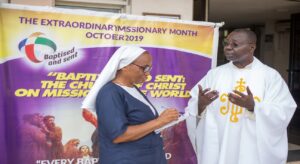
GCBC Press Conferences/Media Events
I was also actively involved in the coverage and reporting of the GCBC press conferences and media events such as official announcements of arrival of a new Apostolic Nuncio to Ghana, appointment and consecration of new Bishops of Ghana, of which within the period of my communication apostolate (2019-2025), I have witnessed the appointment and consecration of 7 new Bishops in the Ghanaian hierarchy and also reported on the official introduction of some of them to Ghana’s President.
Over the period, the GCBC apart from its statutory programmes has also engaged in advocacy and stakeholders meetings; addressed issues of mutual concern such as the issue of referendum in the 2020 Ghana general elections, the need for free and credible elections (2020 and 2024), the illegal gold mining known as “Galamsey” menace, care of the environment and afforestation (Green Ghana) and GCBC’s “Action Plan on “Care of Our Common Home” inspired by Pope Francis 2015 Encyclical – “Laudato Si’”.
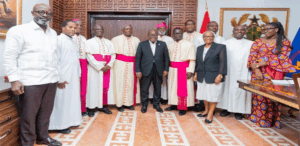
Also, issues of security – the Sahel Peace Initiative programme, issues bordering on quality education, declining Catholic population, youth empowerment and the necessity for peaceful coexistence among the different religious faith expressions in Ghana, which necessitated the establishment of the Annual Joint Meeting of the GCBC and the Muslim Leaders in 2022; talk less of the LGBTQ+ legislation saga in Ghana which currently is still hanging. In all of these, I found myself in active involvement in learning and reportage.
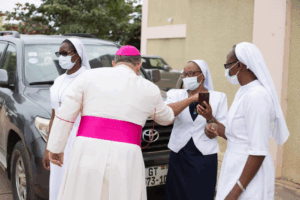
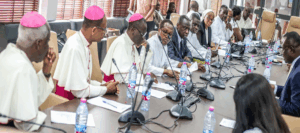
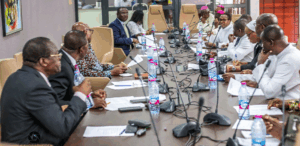
Participation in GCBC Statutory Programmes
I participated at some level in the planning and execution of some of the GCBC statutory programmes, especially in the coverage of their Annual Plenary Assembly held every November by rotation over the 19 Dioceses and the Donkorkrom Vicariate. The very first function I performed for the Conference as Communications Officer was to open a group WhatsApp platform for the Bishops at my first attendance of their Annual Plenary Assembly held at Elmina, in the Catholic Archdiocese of Cape Coast in November 2019. Since then, the group platform has proved to be a dynamic channel for information exchanges and interactions among all the members of the Conference, as well as a virtual venue for the celebrations of their birthdays, priestly and episcopal ordination anniversaries.
On my part, I must say I have enjoyed the awesome privileged position of serving the Bishops as their WhatsApp Administrator; sometimes, sitting quietly in my comfort zone, enjoying some senior jokes.
One of my special duties in the office of the Secretary General was to accompany him to some of the GCBC events or meetings and prepare reports, and share on the GCBC WhatsApp platform. That way, their Excellences who were unavoidably absent from such meetings or special events, especially the Emeritus Bishops, would have a fair idea of what transpired at such meetings ahead of the formal reports or other reports.
I was also granted the opportunity to attend all the (6) November Annual Plenary Assemblies of the GCBC (2019-2024), out of which two were combined with a retreat. They were: Cape Coast Archdiocese -2019, Keta Akatsi Diocese -2020, Wa Diocese 2021, Donkorkrom Vicariate -2022, Sunyani Diocese -2023, and the Golden Diocese, Obuasi – 2024. Being physically present in these six Arch/Dioceses has helped me to appreciate the Catholic Church in Ghana, the different people and their cultural expressions and also to exercise my apostolate of presence.
Apostolate of Presence
My life and apostolate as an SHCJ Sister are not only about doing; it is also about “being”. The being has to do with who I am as a Religious: a woman specially consecrated in love to Jesus.
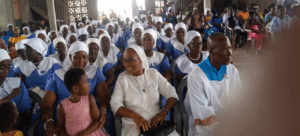
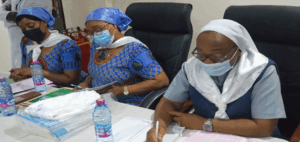
Christ, in his Church, is to be a sign of Christ’s presence in the world. In that regard, I have exercised my apostolate of presence with the Church in Ghana by my physical presence in the Arch/Diocese and my interactions with the people, beginning with the NCS staff, with people on the streets, at bus stations, markets, as well as at official gatherings. I have been present at birthday parties, weddings, funerals, other celebrations, and at the Parish where I had my secondary apostolate (St. Mark Catholic Church, Ashongman); reminding everyone I come across as well as myself (by my very presence) that God lives and acts in us and our world, and for us to rejoice in God’s presence. I have also been enriched by the presence, spirituality and culture of the people. Not only I, but other members of the SHCJ are visibly and joyfully present anywhere we find ourselves; for that is our mission: “to help others believe that God lives and acts in them and to rejoice in his presence”
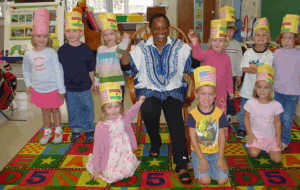
At home here in the Archdiocese of Accra, we, the SHCJs in our Accra community are visibly present in our convent at Parakou Estate, Dome, and at all our places of primary and secondary apostolate, at functions and wherever we are led by the Spirit of God to be; living our lives as our Mother Foundress, Venerable Cornelia Connely admonishes us. She says, “Be yourself, but let that self be who God meant you to be”.

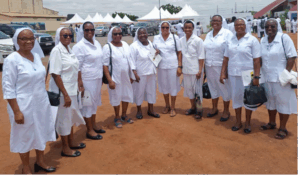
Challenges
- Clericalism – The exaggerated view and practice in the Catholic Church; that positions of authority and decision making in the Church belong only to the clergy – (Bishops, Priests. Deacons), continues to constitute a major challenge in my way, and those of other women religious, in terms of occupying positions of authority and playing our impactful roles. Unfortunately, some Religious Sisters and the laity, to a large extent, align themselves with the view, to their detriment.
- In my case, right from my first mission, I was viewed as occupying a position meant for the priest, and the situation has not been different in my subsequent communication apostolate in both Ghana and Nigeria. So, to occupy it, I have to face the challenge of ‘going the extra mile’ and I am aware, it has not been different for a few others who, like me, have dared to occupy positions the Church reserved for men only.
- ICT and Digital Literacy – The emergence of Information and Communication Technologies (ICT) and the Digital Media present training challenges to me as one who, though not a digital native, must as of necessity be actively engaged with the virtual and digital world. This, in turn, places some limits on my performances. Digital literacy is, therefore, a challenge for me.
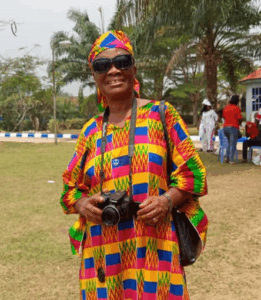 Recommendations
Recommendations
- De-masculinise the Catholic Church, as requested by Pope Francis, especially the Church in Africa and, more especially, the Church in Nigeria and Ghana.
- Begin the process of de-clericalizing the Church by shifting the Church’s focus from a predominantly male-centred perspective to one that recognises and values the contributions of women within the Church as collated during the Episcopal phase of the synod, held at Sunyani in June 2022.
- Positions of leadership and decision-making should not solely be tied to ordination: women, especially the Religious Sisters, should also be given positions of leadership and authority in the Church, to exercise their God-given talents in the pastoral care of the people of God.
- Training in relevant fields – Women, on their part, both religious and lay, should strive to update themselves through study and training in the relevant fields of catechises and other pastoral ministries and be available and willing to take up positions of ‘leadership for service’ in the Church. Again, this is the age of Information and Communication Technologies; in whatever field you are, try to be computer literate.
- The GCBC needs to begin the process of de-clericalization and de-masculinization of the Church in Ghana, by first taking a look at the current structure of the NCS, in which all the Executive Secretaries or Heads of the various Departments are either priests or males.
- Furthermore, some of the departments need not be “Sole Proprietor” Departments, especially the national DEPSOCOM.
Gratitude
I am grateful to ‘Their Excellencies’ for their indescribable level of maturity on all counts, throughout the 6 years of my presence and working relationship with them. I thank the immediate-past and incumbent Secretaries General; all the NCS Priests staff, the Executive Secretaries or Heads of Departments and all the other staff, for their cordial working relationship. I express gratitude to the entire people of Ghana for their love and tolerance of my idiosyncrasies. I ask for pardon for those I have offended in one way or another other and I have forgiven those I think have offended me. I have learnt a lot from everyone and also passed on the little I could. On the whole, all is well that ends. Continue the good works!
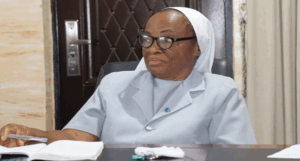
As scripture says, there is a time for everything under the sun; a time to get in and a time to get out. For those of my fellow religious, who kept asking me: How did you get there?
My answer is what the famous Mexican female historian, Maria Louisa Aspe, once said about the role of women in the Catholic Church: “No one will give you the space in the Church; you have to occupy it”. And I would add, “by God’s grace and by hard work”. That was how I got there.
Some memorable photos during her work at the National Catholic Secretariat
